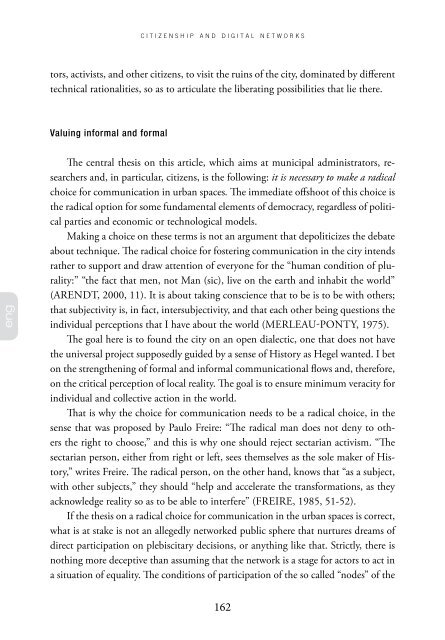Sergio Amadeu da Silveira - Cidadania e Redes Digitais
Sergio Amadeu da Silveira - Cidadania e Redes Digitais
Sergio Amadeu da Silveira - Cidadania e Redes Digitais
You also want an ePaper? Increase the reach of your titles
YUMPU automatically turns print PDFs into web optimized ePapers that Google loves.
eng<br />
c i t i z e n s h i p a n d d i g i t a l n e t w o r k s<br />
tors, activists, and other citizens, to visit the ruins of the city, dominated by different<br />
technical rationalities, so as to articulate the liberating possibilities that lie there.<br />
Valuing informal and formal<br />
The central thesis on this article, which aims at municipal administrators, researchers<br />
and, in particular, citizens, is the following: it is necessary to make a radical<br />
choice for communication in urban spaces. The immediate offshoot of this choice is<br />
the radical option for some fun<strong>da</strong>mental elements of democracy, regardless of political<br />
parties and economic or technological models.<br />
Making a choice on these terms is not an argument that depoliticizes the debate<br />
about technique. The radical choice for fostering communication in the city intends<br />
rather to support and draw attention of everyone for the “human condition of plurality:”<br />
“the fact that men, not Man (sic), live on the earth and inhabit the world”<br />
(ARENDT, 2000, 11). It is about taking conscience that to be is to be with others;<br />
that subjectivity is, in fact, intersubjectivity, and that each other being questions the<br />
individual perceptions that I have about the world (MERLEAU-PONTY, 1975).<br />
The goal here is to found the city on an open dialectic, one that does not have<br />
the universal project supposedly guided by a sense of History as Hegel wanted. I bet<br />
on the strengthening of formal and informal communicational flows and, therefore,<br />
on the critical perception of local reality. The goal is to ensure minimum veracity for<br />
individual and collective action in the world.<br />
That is why the choice for communication needs to be a radical choice, in the<br />
sense that was proposed by Paulo Freire: “The radical man does not deny to others<br />
the right to choose,” and this is why one should reject sectarian activism. “The<br />
sectarian person, either from right or left, sees themselves as the sole maker of History,”<br />
writes Freire. The radical person, on the other hand, knows that “as a subject,<br />
with other subjects,” they should “help and accelerate the transformations, as they<br />
acknowledge reality so as to be able to interfere” (FREIRE, 1985, 51-52).<br />
If the thesis on a radical choice for communication in the urban spaces is correct,<br />
what is at stake is not an allegedly networked public sphere that nurtures dreams of<br />
direct participation on plebiscitary decisions, or anything like that. Strictly, there is<br />
nothing more deceptive than assuming that the network is a stage for actors to act in<br />
a situation of equality. The conditions of participation of the so called “nodes” of the<br />
162


